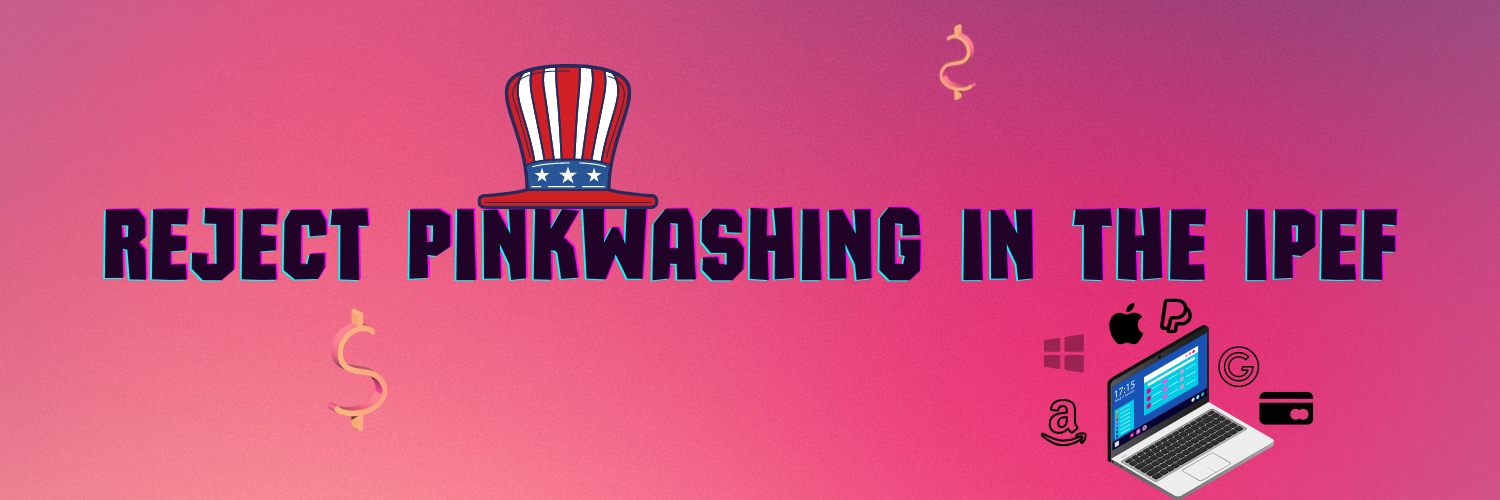IT for Change, Public Services International (Asia & Pacific), and Third World Network request your endorsement of this statement rejecting pinkwashing in the IPEF
We are planning to release this statement on 13 December 2022, at the first negotiating round of the Indo-Pacific Economic Framework in Brisbane, Australia (December 10-15, 2022).
Sign this statement by Monday, 12 December, 19.00 hours IST / 13.30 hours GMT as we need to make our voice heard.
Why should I sign?
WOMEN'S RIGHTS ORGANISATIONS AND ALLIES OPPOSE THE GENDER "UPSKILLING INITIATIVE" AS AN IPEF CARROT
IT for Change, Public Services International (Asia & Pacific), and Third World Network with the undersigned women’s rights organisations, labour unions, and allies, oppose the use of Big Tech “upskilling” initiatives for women to encourage countries to sign on to the Indo-Pacific Economic Framework (IPEF).
We acknowledge that the Biden Administration and others have recognised that trade rules can have negative human rights impacts on women, workers, and Indigenous Peoples. We recognise steps taken to develop new approaches to economic cooperation that incorporate rights of labour and Indigenous Peoples, gender equality, and a fairer economy. However, inviting US Big Tech firms to expand their reach in the Global South, promoting their products to women under the guise of “upskilling”, and adopting the digital trade rules Big Tech wrote to deepen their power, will undermine, not advance, women’s human rights.
The Upskilling Initiative for Women and Girls promises training by 14 US Big Tech companies to women in IPEF countries. Yet it appears that much of the promise is simply re-packaged training that is already available and primarily designed as a tool to increase market presence and profits. The initiative is designed to encourage developing countries to agree to “high-standard commitments” on the “promotion of cross-border data flows” which translates to the adoption of rules that have been included in other trade agreements at the behest of Big Tech. Rules that a) restrict governments being able to effectively regulate Big Tech, b) inhibit governments from implementing rights-enhancing data policies for political sovereignty and economic self-determination, c) enable algorithms to be kept secret, d) constrain governments from requiring tech companies to have a local presence, and e) stop governments from pro-actively developing digital industrial policies, including autonomous digital public infrastructure. All of these can be extremely harmful to women’s human rights.
The initiative involves companies that have undermined labour rights, refused to recognise workers as employees, have used tax havens to avoid making tax contributions to public services essential for gender equality. Previous trade agreements have included commitments to gender equality, but those agreements have instead harmed women’s human rights by liberalising services, promoting the privatisation of public services essential in addressing discrimination and exclusion, deregulating the labour market, and promoting a race to the bottom in wages and conditions, and denying governments the policy space required for people to progressively realise their economic rights.
To set new standards in global trade and economic cooperation that advance gender equality, member states could instead commit to implementing their obligations under international human rights law and guaranteeing all state parties the policy space necessary to advance the sustainable development agenda, including gender equality. Such cooperation could commit each country to implement laws recognising platform workers – especially the increasing numbers of women joining invisible segments of platform work – as employees entitled to living wages, decent work, data rights, and social protection. Commitment to comply with relevant international labour laws can be a part of the cooperation. It could establish real commitments to ending the use of tax havens, commit each country to public and country-by-country reporting of corporate taxes, set a better minimum corporate tax rate, and allow for unitary taxation to be applied in a way that guarantees funds for low- and middle-income countries and their social and care infrastructure.
We call on governments to put aside the paternalism of the corporate upskilling initiative, and make the IPEF negotiations open and transparent, so that all proposals can be considered on their merit. This requires negotiators to engage meaningfully with women’s human rights organisations, unions, Indigenous Peoples, farmers, and other social movements. Moreover, the IPEF should not attempt to establish substantive rules that erode policy space of developing countries, especially to design their own digital industrialisation policy and maintain their data sovereignty.
Why should I sign?

